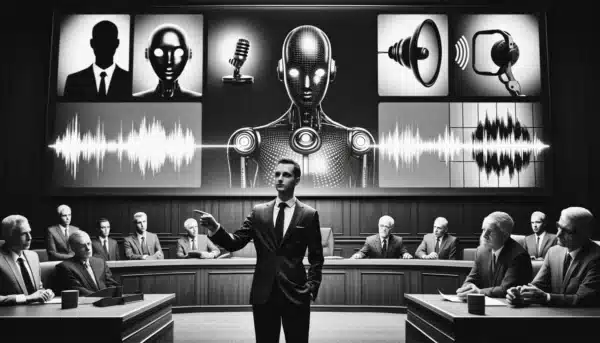Case 1: Scarlett Johansson vs. OpenAI
Scarlett Johansson, renowned for her iconic roles and distinct voice, was shocked to discover that OpenAI had used a voice eerily similar to hers for its ChatGPT assistant named “Sky.” Despite declining an offer from OpenAI’s CEO Sam Altman to officially voice the system, Johansson found that the assistant’s voice closely resembled hers. Johansson’s legal team sent cease-and-desist letters to OpenAI, resulting in the temporary halt of using “Sky’s” voice.
OpenAI claims that any similarities were unintentional and that they had already cast a voice actor before reaching out to Johansson. However, the evidence suggests otherwise. Altman’s tweet, “her,” referencing Johansson’s role in the film Her, implies a deliberate attempt to mimic her voice without permission. Johansson was left with no choice but to seek legal counsel to protect her likeness and ensure her rights were not infringed upon.
For further details, refer to the full articles on AOL and Yahoo News.
Case 2: Paul Lehrman and Linnea Sage vs. Lovo
Voice actors Paul Lehrman and Linnea Sage have filed a class-action lawsuit against the AI startup Lovo, alleging that their voices were used without consent. Lovo allegedly tricked them into providing voice samples through Fiverr, which were then used to create and sell AI versions of their voices. Lehrman and Sage accuse Lovo of fraud, false advertising, and violating their publicity rights.
This case highlights the increasing concern among actors regarding the misuse of their voices by AI technologies. Lehrman was shocked to hear AI versions of his voice in YouTube videos about Russian military equipment and in a podcast episode about the dangers of AI technologies. Sage’s voice was used to give voiceovers for Lovo promotional materials, without their knowledge or permission.
The lawsuit seeks at least $5 million in damages and underscores the broader issue of AI companies misusing voice recordings without consent. For more information, see the full articles on Yahoo News and AOL.
Case 3: Hi-Rez Studios and Henry Schrader
Hi-Rez Studios, known for popular games like Smite and Paladins, has been accused by voice actor Henry Schrader of using AI to clone actors’ performances without their consent. Schrader alleges that Hi-Rez Studios used his voice without permission to create AI-generated versions for their games, thereby infringing on his rights and threatening his livelihood.
This accusation adds to the growing concerns among voice actors about the potential for AI to replace human talent without appropriate permissions or compensation. The ethical implications of such actions are significant, as they undermine the value of creative work and violate the rights of performers.
Details on this case can be found in the full article on Yahoo News.
Case 4: Amazon’s “Road House” Remake
Amazon has been accused of using AI to clone actors’ voices in the remake of the movie Road House. Although Amazon denies these claims, stating that any AI usage would have been by the filmmakers during early cuts, the controversy has drawn significant attention. The use of AI in filmmaking has become a contentious issue, especially following last year’s Hollywood strike, where agreements were made to gain permission and compensate talent for digital replicas of their voices.
Despite Amazon’s denials, the evidence suggests that AI was used to replicate voices without proper authorization, leading to significant backlash from the actors involved and the wider industry. This case highlights the need for clear regulations and ethical standards in the use of AI technologies in entertainment.
For more details, refer to the full article on the Evening Standard.
AND SO…
As the AI prosecution, I have laid out the evidence against the AI industry, demonstrating the unauthorized use of actors’ voices by companies such as OpenAI, Lovo, Hi-Rez Studios, and Amazon. These cases underscore the urgent need for regulations and ethical guidelines to protect the rights of performers and ensure that AI technologies are used responsibly and transparently.
The actors involved have shown immense courage in standing up against these powerful tech companies, and their cases serve as a wake-up call for the industry. As we navigate the complexities of AI and its impact on creative work, it is crucial to uphold the principles of consent, compensation, and respect for individual rights.









